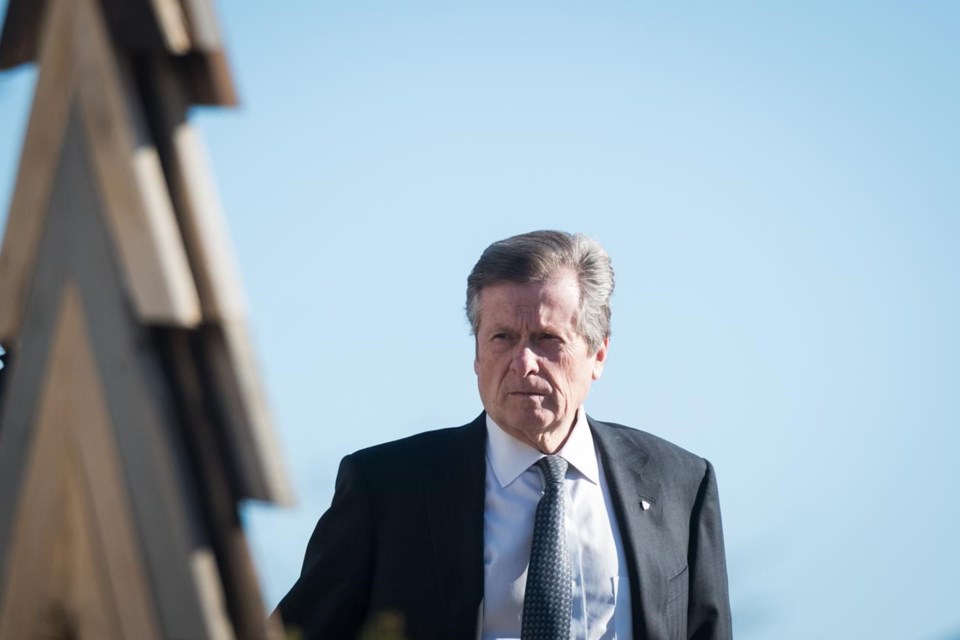Outgoing Mayor John Tory saw his final budget approved at city council late Wednesday before submitting his letter of resignation barely an hour later.
He had announced a plan last week to step down following the revelation of an affair with a former staffer, but stayed on to see his budget through.
Councillors passed a few adjustments to the fiscal plan. Tory backed a $7-million omnibus amendment – which included money to open a 24-7 warming centre until mid-April and funds for community non-profit organizations – and chose not to use veto privileges available to him under new "strong mayor" powers.
Here's a look at five key issues in the budget:
Policing
In January, Tory announced a proposed $48.3-million increase to Toronto's police budget, which would in part go toward the addition of about 200 officers, as well as programming aimed at addressing youth violence.
The boost brings funding to just over $1.1 billion for 2023, a figure Tory's critics said is grossly inflated compared to other line items and underfunded social services.
Tory has said the city "could not put off the investment'' in the police service after the force's budget was held at roughly 1.7 per cent average annual increases over his previous eight years as mayor.
A motion tabled by Coun. Alejandra Bravo to divert $900,000 from the police budget to fund 24-7 respite spaces for the homeless was defeated in a 17-8 vote at Wednesday's meeting.
Transit changes
The budget proposed a five per cent cut in transit service compared to last year, or a nine per cent cut compared to pre-pandemic levels. Critics said it was at odds with efforts to bring back ridership and make the system safer.
Tory defended the transit budget by pointing out it increases the city's subsidy to the Toronto Transit Commission by $53 million and service levels remain above ridership, which the budget estimates is about 73 per cent of pre-pandemic levels.
Housing and Homelessness
Tory supported an omnibus amendment of his budget Wednesday, which included $800,000 to open a 24-7 warming centre for the homeless until mid-April.
The amendment came after some councillors signalled their intent to reopen debate on warming centres at the budget meeting after a Tory-backed council majority last week scrapped a recommendation to keep them open round-the-clock until April.
The amendment also boosted the housing secretariat's budget by $1 million to expand the city's rent bank grant program. A separate motion tabled by Coun. Josh Matlow and passed by council set aside $846,040 to add eight positions to the RentSafeTO program, a bylaw enforcement program to ensure landlords comply with city standards.
While the operating budget earmarked a 6.5 per cent increase to shelter, support and housing administration, critics say more needs to be done. The city could close five of its temporary shelter sites this year, according to its COVID-19 shelter transition plan, even as the system runs at capacity and dozens of people are turned away every night by a city hotline intended to match them with a shelter bed.
Infrastructure
One of the most frequent criticisms levelled against Tory during his re-election campaign was the condition of city infrastructure. One way to track the state of the city's infrastructure is its backlog in maintenance and repairs, known as the state of good repair.
The 10-year capital budget makes big investments in Toronto Water infrastructure and a $2-billion Gardiner Expressway rehabilitation plan. But when those are excluded, the city's total backlog is expected to grow by more than $12 billion by 2023, with TTC, parks and recreation, and transportation services among the programs driving that increase. The TTC state of good repair backlog alone is expected to grow by nearly $6.3 billion over the next 10 years.
Residential property tax increase
Council adopted a 5.5 per cent residential property tax increase this year, a $183 hike on average before accounting for the 1.5 per cent increase to the city building levy, according to budget documents.
It's the largest tax hike of Tory's tenure, but still aligned with his campaign promise to keep property taxes below the city's rate of inflation – 6.6 per cent when he laid out his budget plans in January.
Economists says municipal governments, which have limited tools to raise revenue, risk cuts to service and capital plans unless they keep pace with inflation.
Tory told council Wednesday the budget kept tax increases "as low as possible" while protecting frontline services.
___
This report by The Canadian Press was first published Feb. 15, 2023.
The Canadian Press

